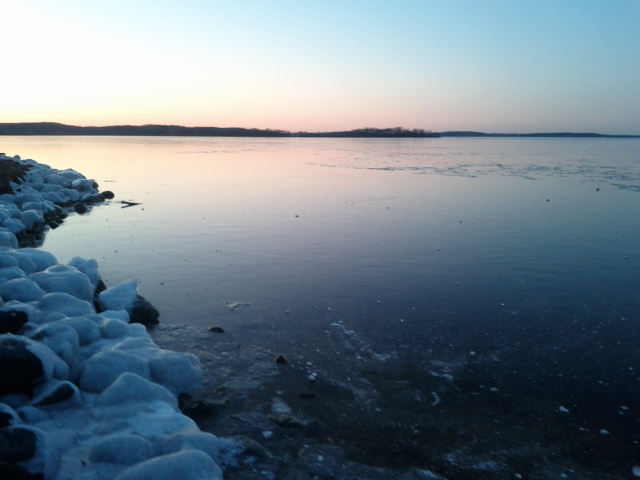Oct 7 2020
According to new research, climate change is causing warmer winters, which then result in more ice-free years for lakes in the Northern Hemisphere.
 A photo of Wisconsin’s Lake Mendota taken in winter 2012. New research finds Lake Mendota and more than 100 others in the Northern Hemisphere are experiencing more ice-free years due to climate change. Image Credit: Sapna Sharma.
A photo of Wisconsin’s Lake Mendota taken in winter 2012. New research finds Lake Mendota and more than 100 others in the Northern Hemisphere are experiencing more ice-free years due to climate change. Image Credit: Sapna Sharma.
Recently, scientists examined approximately 80 years of lake ice data, spanning from 1939 to 2016, for 122 lakes that usually freeze each winter. They discovered ice-free years have become over three times more common since 1978 and 11% of lakes examined faced a minimum of one totally ice-free year since 1939.
This trend is connected to unusually warm winter temperatures, and the researchers state that it will persist with growing frequency because of climate change. Such ice-free years could have major ecological, economic, and cultural effects.
“Lake ice is becoming increasingly absent,” said Alessandro Filazzola, a community ecologist at York University and the University of Alberta in Canada and lead author of the new study published in AGU’s journal Geophysical Research Letters. “Even under low carbon emissions scenarios, we’re going to have continued ice-free events.”
Communities situated near lakes habitually rely on freezing events for winter recreation activities such as ice festivals and ice fishing, which can result in monetary profits of hundreds of thousands of dollars per weekend.
Lake ice also acts as an ecological “reset,” said Sapna Sharma, an aquatic ecologist at York University (Canada) and the new study’s coauthor. Lakes tend to get warmer in years without ice cover, and they stratify earlier, which could make them more susceptible to poisonous algal blooms. This, in turn, could be detrimental to fish or render lakes unsafe for swimming.
The consequences are more widespread than simply one individual unable to go ice fishing.
Sapna Sharma, Study Coauthor and Aquatic Ecologist, York University
Remarkably, the team observed the same warming trend irrespective of location, signifying global climate change is already affecting Earth’s lakes.
This isn’t just happening in one lake in the northern United States. It’s happening in thousands of lakes around the world.
Alessandro Filazzola, Study Lead Author and Ecologist, York University and University of Alberta
A lake ice database
In the new research, Filazzola and his team were keen to learn how the frequency of lakes’ ice-free years has transformed over time. They chose 122 lakes in Europe, North America, and Asia with a long, reliable record of data from the National Snow and Ice Data Center (NSIDC).
The NSIDC lake ice database comprises historically available data from newspapers, harbors, and other written records and modern data sourced from people who reside close to the lakes.
Lake Suwa in Japan possesses one of the oldest lake ice records in the database, dating back to 1443. The record has been kept by 15 generations of Shinto priests that have celebrated the beauty of lake ice each winter. Other culturally essential lakes in the dataset include Lakes Baikal, Champlain, Geneva, Balaton, and Michigan.
Filazzola, Sharma, and their contemporaries examined ice-free years in their selected lakes, comparing how frequently this extreme event took place in the first 40 verses the last 40 years of the research period.
If a lake did not have 100% ice cover for even one day, it was said to be an ice-free year. They then compared the lake ice data with climate cycles such as El Niño and the North Atlantic Decadal Oscillation and local air temperatures to better comprehend the reasons behind lake ice deviations.
They learned ice-free years took place much more frequently in the latter half of their research period, with 31 recorded ice-free events before 1978 and 108 ice-free events after that year.
Since 1990, Lake Champlain and Grand Traverse Bay in Lake Michigan have both endured three consecutive years without ice cover. Lake Suwa, which once froze recurrently, freezes an average of two years every 10 years at present, according to the research.
Even in the last 40 years versus the last 80 years, there’s already an obvious pattern that’s occurring and it’s showing that we’re already experiencing a response from warming, which will likely get worse.
Alessandro Filazzola, Study Lead Author and Ecologist, York University and University of Alberta
The results revealed local winter air temperatures were the ideal predictors of ice-free years, which became expressively more likely once average winter temperatures increased to −4 °C (25 °F). The team observed that lakes in more coastal and southern regions were most susceptible to facing ice-free years since warming was at a high level.
“I think it is intuitive,” Sharma said of their research results. “But it also gives us a historical snapshot to understand that the climate is changing. It’s not normal that these lakes are not freezing.”
“I am delighted by this paper,” said John Magnuson, a limnologist at the University of Wisconsin Madison who has researched lake ice studies in the past but was not involved in this current study, calling it “a significant paper that provides new information and insights about a climate-sensitive component of lake ecosystems to climate change.”
Journal Reference:
Filazzola, A., et al. (2020) Climate change drives increases in extreme events for lake ice in the Northern Hemisphere. Geophysical Research Letters. doi.org/10.1029/2020GL089608.